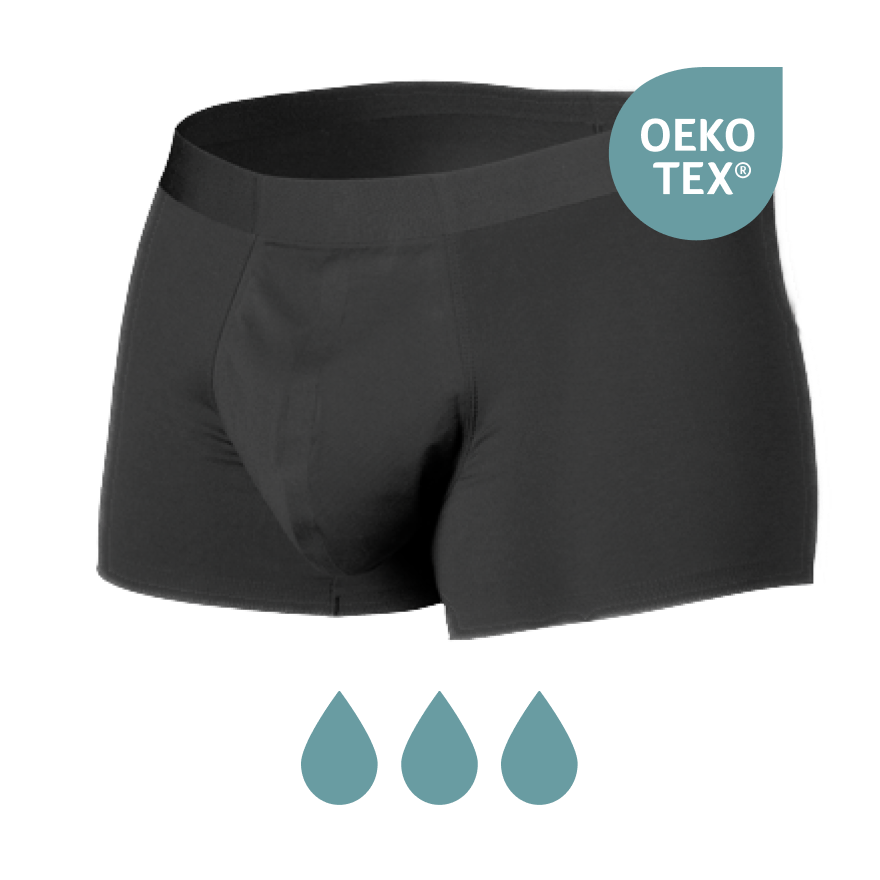After prostate operation you can suffer from incontinence. The duration and nature of this unwanted urine loss can vary per person. This complaint often lasts a few months to a year before they disappear again. Fortunately, there are practical tools on the market to reduce your symptoms as much as possible, and there are useful exercises to improve the process. This way you can continue to participate in fun activities outdoors.
Causes of incontinence after prostate surgery
If your pee runs into your bladder, it is kept in by two valves (sphincter muscles) that remain closed until your body "says" that they have to open when you pee. There is an internal and an external valve.
If you are operated on to remove your prostate, the internal urine valve must be removed as part of the prostate surgery. The external urethors that you operate to let urine out or to stop your urine strap still works.
Usually one working valve (the external valve) is sufficient to keep your urine under control, but this depends on whether your pelvic floor muscles and nerves also work well.
On the other hand, radiation for prostate cancer can also influence your sphincter and bladder, because radiation damages and irritates healthy tissue in the area. This can affect how well they function.
How long does incontinence take after prostate surgery?
It is difficult to say exactly how long incontinence takes after prostate surgery. It differs from person to person. The following factors play a role:
- Your age.
- Your overall health, such as obesity or other medical conditions.
- Typical bladder control (before the operation).
For example, people who are generally healthy and younger than 60, for example, have much less chance of long-term urinary incontinence. On the other hand, someone of 80 is more likely to have annoying incontinence if he or she is treated for prostate cancer. Some people suffer from full incontinence where they can no longer stop pee and use a product as a founder or diaper, while others sometimes only drip a little.
The good news is that you should gradually have less urine loss after treatment. The average time that most people need to control peeing again is less than three months.
How is incontinence treated after prostate surgery?
How your caregiver treats incontinence depends primarily on how serious your complaints are and how long they last. It also depends on what kind of incontinence you have (stress incontinence, urge incontinence or both).
If you notice that after the operation you suffer from light to moderate urine loss, your urologist or gynecologist can propose to start with non-invasive therapies, such as medication or physiotherapy exercises for your pelvic floor muscles. People with loss of urine that lasts more than three months or with more serious complaints may need surgery. Your doctor usually recommends the non-invasive therapies before he recommends surgery.
Underwear for incontinence after prostate surgery
There are different types of incontinence products, such as Washable underwear , absorbent pads or incontinence pants. Robin specializes in incontinence material for men after prostate surgery.
How can I strengthen my bladder after prostate surgery?
Exercises to strengthen your pelvic floor, called cones are often the first treatment for incontinence. Your doctor can recommend your cones to improve the functioning of your pelvic floor muscles. Some caregivers combine cones with a therapy called biofeedback.
Your pelvic floor muscles are a group of muscles that keep your pelvic organs up like a hammock. They also support a healthy bladder and intestinal function. If you were born with a prostate, you may never have strengthened your pelvic floor (because that was not necessary). But if your prostate has been removed, you must now trust your pelvic floor muscles. That is why pelvic floor exercises are very important after a prostate removal operation.
Strengthening the pelvic floor works very well with people with light to moderate loss of urine. If your complaints do not improve, your doctor can recommend additional treatments.
Which medicines are used in incontinence after prostate surgery?
If you have urge incontinence, certain medicines can help. Some of these medicines relax your bladder so that your bladder can catch more pee. Others influence the way your brain sends signals to your bladder to indicate that it is full. Your care provider will discuss with you which medicines can work for you and what the possible side effects are.
There are no good medicines for the other form of incontinence (stress incontinence).
With which operations can urine incontinence be treated after your prostate has been removed?
If after a prostate surgery you suffer from exercise incontinence that lasts more than six months to a year, your midwife or gynecologist can recommend an operation. There are two main types operations for urinary incontinence: the urethral sling and the artificial urinary sphincter (AUS).
Can you prevent incontinence after prostate surgery?
Your surgeon tries to limit the damage to your bladder and sphincter muscles during prostate cancer operation. Although progress is being made constantly, you can still expect at least temporary incontinence after prostate surgery. The precise extent and symptoms that you will experience depend on your age and health, the size of the cancer and whether you have also undergone radiation or other treatments. You must discuss your concerns about incontinence with your doctor.
When should I call the doctor?
When should I call my care provider?
Contact your care provider if you experience symptoms of urinary incontinence after prostate surgery. It can be uncomfortable to talk about it, but your care provider is there to help you.
















